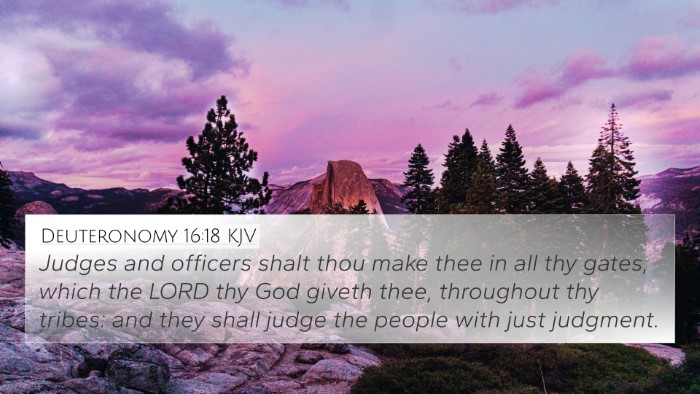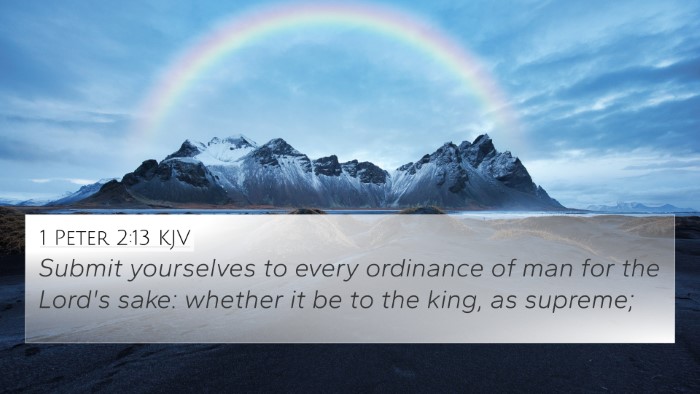Understanding 2 Chronicles 19:5
2 Chronicles 19:5 states: "And he set judges in the land throughout all the fenced cities of Judah, city by city." This verse highlights King Jehoshaphat's reforms aimed at establishing righteous governance in Judah. Here, we explore the implications and meanings of this scripture through insights from notable public domain commentaries.
Verse Meaning
This verse emphasizes the importance of justice and righteous leadership. Jehoshaphat's appointment of judges in every city illustrates a systematic approach to governance that aimed to ensure fairness and accountability.
Insights from Commentaries
- Matthew Henry: Henry notes that Jehoshaphat's initiative to appoint judges demonstrates a proactive effort to uphold God's laws. He emphasizes the necessity of having just judges who can discern between right and wrong, thereby reflecting God's justice in their judgments.
- Albert Barnes: Barnes emphasizes that the selection of judges 'city by city' suggests a decentralized yet uniform approach to justice. This method ensures that all parts of the kingdom are covered, preventing corruption and promoting judicial integrity.
- Adam Clarke: Clarke remarks on the spiritual significance of establishing judges, interpreting it as aligning secular justice with divine principles. He highlights that the integrity of leaders is vital for a nation's well-being, encouraging a governance model rooted in accountability to God.
Thematic Connections with Other Biblical Texts
Various Bible verses can be cross-referenced with 2 Chronicles 19:5 to deepen understanding:
- Deuteronomy 1:16-17 - God commands that judges be appointed with fairness.
- 2 Samuel 23:3 - Highlights the importance of just leadership in the example of David's last words concerning rulers.
- Proverbs 29:14 - Affirms that leaders who judge fairly will be established and secure.
- Isaiah 1:17 - Encourages seeking justice and correcting oppression, reflecting the core theme of Jehoshaphat's reforms.
- Micah 6:8 - Calls for just living, synergizing with the king’s drive for righteous judgment.
- Romans 13:3-4 - Discusses the role of rulers as servants of God, promoting good and punishing evil.
- 1 Peter 2:14 - Talks about the duty of governments to promote justice and order, which parallels Jehoshaphat's intentions.
Significance of Judicial Appointments
Jehoshaphat's action in appointing judges is significant for several reasons:
- Establishes Authority: By placing judges in various cities, authority and governance are clearly defined.
- Promotes Accountability: It fosters a system where judges are held accountable to God and the law, leading to a more just society.
- Encourages Community Involvement: This approach makes judicial processes more accessible to the common people, fostering trust in leadership.
Practical Applications in Contemporary Governance
Today, Christians can glean lessons from Jehoshaphat's model of judicial appointments:
- Advocacy for Justice: Believers are called to advocate for fair judicial systems that reflect God’s values.
- Participation in Governance: Christians should consider how they can serve in civic duties, including juries or public office, upholding righteousness.
- Prayer for Leaders: Interceding for those in authority, that they may govern wisely and justly as Jehoshaphat sought to do.
Concluding Thoughts
2 Chronicles 19:5 serves as a reminder of the importance of justice in leadership. Through the insights gained from various commentaries and the connections to other scriptures, the call for righteousness in governance resonates deeply. The thematic connections and cross-references further illustrate God's design for justice and moral integrity, encouraging believers to pursue these values in their lives and communities.
Further Study on Cross-Referencing Biblical Texts
Utilizing tools for Bible cross-referencing can enhance understanding and provide deeper insights into scriptures. For those interested in exploring cross-references:
- Employ a Bible concordance to find key terms and verses related to themes of justice and governance.
- Explore cross-reference guides that can offer thematic connections between different books of the Bible.
- Engage in cross-reference Bible study methods to identify links between Old and New Testament teachings.
- Utilize resources that compile comprehensive Bible cross-reference materials for sermon preparation or personal study.






